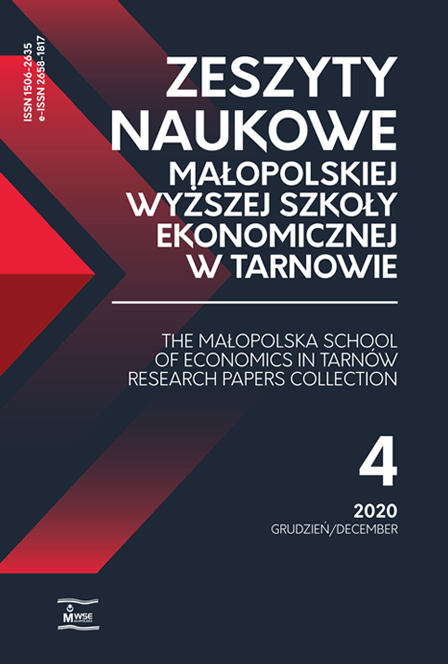Abstract
Terms such as Industry 4.0, Logistics 4.0, smart factory, smart logistics as well as digitalization can nowadays be regarded as keywords in both scientific and economic practice. What is taking place at the moment is the beginning of the fourth industrial revolution, which is driven by rapid technological advancements, especially visible in the field of digital transformation, autonomous machines or fully automated warehouses.
Strong competition on the domestic and foreign market and growing customer expectations suggest that manufacturing companies should not only increase production on a constant basis, but they should find also a way to personalize it, which means manufacturing short series of products designed to meet the needs of specific customers, but also personalizing human work itself. In this system, or a kind of set-up, the role of the human and the consequent workload associated with a given job change. Technology is increasingly replacing not only physical human work, but also human beings as decision-makers. It is giving rise to completely new situations, in which it is necessary to search for new forms of cooperation between human beings and the technological/ environmental ones. This kind of production is the ultimate goal of the fourth industrial revolution.
The purpose of this paper is to analyze the impact of digitalization and Industry 4.0 on the optimization of production processes, supply chain and human work. The authors discuss the concept of Industry 4.0, hence the fourth industrial revolution concerning system integration and networking. They present the assumptions of Logistics 4.0 and include adaptive, resource-efficient and user-friendly approaches, concepts. The authors also discuss the application of Lean management in the concept of Industry 4.0, and the ergonomic inclinations of the individual pillars of Industry 4.0. The conclusion summarizes the considerations on the impact of digitalization and Industry 4.0 on the improvement of production processes and work ergonomics.
References
Andelfinger, V., Hänisch, T. (eds.). (2017). Industrie 4.0. Wie cyber-physische Systeme die Arbeitswelt verändern. Wiesbaden: Springer Gabler. ISBN 9783658155568.
View in Google Scholar
Astor. (2018). Official website [online, accessed: 2018-03-10]. Kraków: Astor. Retrieved from: www.astor.com.pl.
View in Google Scholar
Bauernhansl, Th., ten Hompel, M., Vogel-Heuser, B. (eds.). (2014). Industrie 4.0 in Produktion, Automatisierung und Logistik. Anwendung, Technologien, Migration. Wiesbaden: Springer. ISBN 9783658046811.
View in Google Scholar
Bayme vbm. (2018). Official website [online, accessed: 2018-03-10]. Retrieved from: www.baymevbm.de.
View in Google Scholar
Becker, K. et al. (2017). Digitalisierung des Einkaufs und der Logistik. Kiel: Fachhochschule.
View in Google Scholar
Benfer, D. (2016). Industrie 4.0 verwirklichen. Logistik Heute. 12–13.
View in Google Scholar
Bounsoville, T. (2017). Logistik 4.0. Die digitale Transformation der Wertschöpfungskette. Wiesbaden: Springer Gabler. ISBN 9783658130121.
View in Google Scholar
Braun, T. (2017). Chancen und Risiken von Industrie 4.0 für kleine und mittlere Unternehmen. Hamburg: Diplomica Verlag. ISBN 9783961465408.
View in Google Scholar
Butlewski, M. (2017). Taxonomy of responsibility allocation in Human-Machine Systems with different levels of automation. MATEC Web of Conferences, 137, 01002. DOI: 10.1051/matecconf/201713701002.
View in Google Scholar
Butlewski, M., Jasiulewicz-Kaczmarek, M., Misztal, A., Sławińska, M. (2015). Design methods of reducing human error in practice. In: T. Nowakowski et al. (ed.). Safety and reliability: Methodology and applications, proceedings of the European Safety and Reliability Conference, ESREL 2014, Wrocław, Poland, 14–18 September 2014 (pp. 1101–1106). London: CRC Press and Balkema Book. ISBN 9781315736976.
View in Google Scholar
CIA. (2018). The World Factbook [online, accessed: 2018-03-22]. Washington, DC: Central Intelligence Agency. Retrieved from: https://www.cia.gov/library/publications/the-world-factbook/fields/2177.html.
View in Google Scholar
Czaja, F. (2016). Auswirkungen von Logistik 4.0 auf Mittelstand und Handwerk. Hamm: Hochschule für Logistik und Wirtschaft.
View in Google Scholar
Fasel, D., Meier, A. (eds.). (2016). Big Data. Grundlagen, Systeme und Nutzungspotenziale. Wiesbaden: Springer Fachmedien. ISBN 9783658115883.
View in Google Scholar
Filler, I. (2014). Auswirkungen von Industrie 4.0 auf die Informations- und Kommunikationssysteme der Produktions- und Lagerlogistik. München: Grin.
View in Google Scholar
Fischer, R. (2016). Logistik 4.0: Herausforderung für Industrie und Logistikdienstleister. Regensburg: Fraunhofer.
View in Google Scholar
Göpfert, I., Braun, D., Schulz, M. (eds.). (2017). Automobillogistik. Stand und Zukunftstrends. Wiesbaden: Springer Gabler. ISBN 9783658111021.
View in Google Scholar
IND4LOG4 (2015). Industrie 4.0 und ihre Auswirkungen auf die Transportwirtschaft und Logistik. Berlin: bmvit.
View in Google Scholar
Industrie 4.0. (2018). Industrie 4.0 Plattform [online, accessed: 2018-03-10]. Berlin: Bundesministerium für Wirtschaft und Energie, Bundesministerium für Bildung und Forschung. Retrieved from: www.plattform-i40.de.
View in Google Scholar
Industry 4.0. (2018). Industry 4.0. Portal nowoczesnego przemysłu [online, accessed: 2018-03-10]. Warszawa. Retrieved from: www.przemysl-40.pl.
View in Google Scholar
Jahn, M. (2016). Ein Weg zu Industrie 4.0. Geschäftsmodell für Produktion und After Sales. Gruyter de Oldenbourg. ISBN 9783110449518.
View in Google Scholar
Janewers, J. (2017). Auswirkungen von Logistik 4.0 auf das Controlling. Hamburg: Tredition GmbH. ISBN 9783743986091.
View in Google Scholar
Lödding, H., Riedel, R., Thoben, K.-D., von Cieminski, G., Kiritsis, D. (eds.). (2017). Advances in production management systems: The path to intelligent, collaborative and sustainable manufacturing. Cham: Springer Nature. ISBN 9783319669229.
View in Google Scholar
Pocket, B. (2016). Logistik auf der ersten und letzten Meile im Wandel. Berlin: Beuth. ISBN 9783410268604.
View in Google Scholar
Schäfer, S., Pinnow, C. (2015). Industrie 4.0. Grundlagen und Anwendungen. Branchentreff der Berliner Wissenschaft und Industrie. Berlin, Wien and Zürich: Beuth Verlag GmbH. ISBN 9783410257806.
View in Google Scholar
Sendler, U. (ed.). (2018). The Internet of Things: Industrie 4.0 unleashed. Berlin and Heidelberg: Springer Vieweg. ISBN 9783662572146.
View in Google Scholar
Voss, P. (ed.). (2015). Logistik – eine Industrie, die (sich) bewegt. Strategien und Lösungen entlang der Supply Chain 4.0. Wiesbaden: Springer Gabler. ISBN 9783658106096.
View in Google Scholar
Wegner, U., Wegner, K. (2016). Einführung in das Logistik-Management. Prozesse, Strukturen, Anwendungen. Wiesbaden: Springer Gabler. ISBN 9783658136741.
View in Google Scholar

This work is licensed under a Creative Commons Attribution-NonCommercial-NoDerivatives 4.0 International License.

